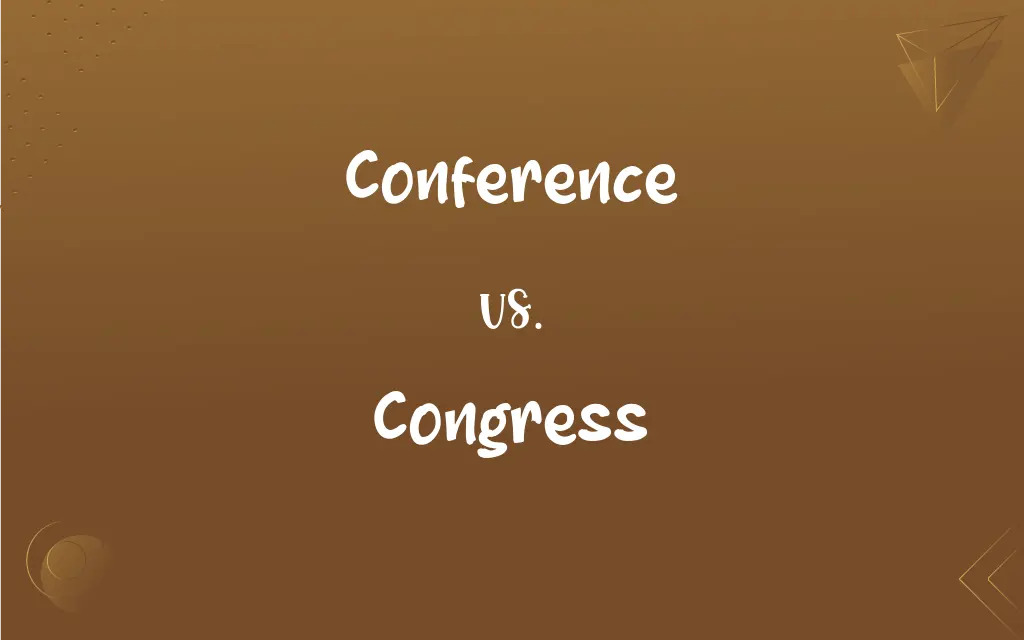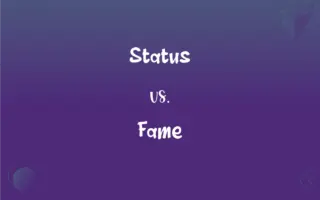Conference vs. Congress: What's the Difference?
Edited by Aimie Carlson || By Harlon Moss || Updated on November 2, 2023
A conference is a gathering for discussion or education, while congress is a formal meeting of representatives for decision-making.

Key Differences
A conference typically refers to an event where individuals or groups come together to discuss a particular subject or to exchange information. It can range from academic gatherings to business meetings. Congress, however, often denotes a formal assembly of representatives with the authority to make decisions, such as the national legislature of the United States.
While a conference can be a one-time event or occur periodically, focusing on a specific theme or topic with various speakers, congresses are usually more structured with established procedures and are held at regular intervals, primarily involving delegates who represent different entities.
In a conference, participants may engage in workshops, networking, and learning opportunities, with the aim of sharing knowledge and best practices. A congress, on the other hand, is more about debating and making decisions on policies, laws, or resolutions and might involve voting procedures.
Organizational context also separates the two; conferences are commonly organized by professional bodies, educational institutions, or corporations, while congresses are often associated with political bodies, unions, or large-scale associations with formal governance roles.
In essence, the key difference lies in their purpose and structure: conferences are more about discussion and exchange, while congresses are about governance and decision-making, each with their own set of objectives and formalities.
ADVERTISEMENT
Comparison Chart
Definition
A meeting for consultation or discussion.
A formal meeting or assembly of representatives.
Purpose
Generally educational or informational.
Often legislative or decision-making.
Frequency
Can be one-off or recurrent without fixed intervals.
Typically held at regular, often statutorily defined, intervals.
Participants
Professionals, experts, or interested individuals.
Elected or appointed officials, representatives.
Formality and Structure
Can be formal or informal, with varied structures.
Highly structured with formal procedures.
ADVERTISEMENT
Conference and Congress Definitions
Conference
A meeting of people with a shared interest.
She presented her paper at the annual history conference.
Congress
A large meeting of people, usually delegates representing groups.
The international trade congress was held to negotiate new agreements.
Conference
An organized discussion event on specific topics.
The technology conference showcased the latest industry innovations.
Congress
An organization of individuals for legislative action.
She was elected to represent her state in Congress.
Conference
A symposium for exchanging ideas.
Experts convened at the climate change conference to discuss solutions.
Congress
A formal assembly of representatives for law-making.
The bill was passed in Congress after much debate.
Conference
A series of workshops or presentations in a professional field.
He networked with peers at the marketing conference.
Congress
A periodic gathering of members from an organization to deliberate common issues.
The congress of labor unions resulted in a collective bargaining agreement.
Conference
A gathering for discussion or professional development.
The international science conference attracted researchers from around the world.
Congress
The national legislative body of the United States.
Congress convened to discuss the new foreign policy.
Conference
A meeting for consultation or discussion.
Congress
A formal assembly of representatives, as of various nations, to discuss problems.
Conference
An exchange of views.
Congress
The national legislative body of a nation, especially a republic.
FAQs
What does congress mean?
A formal gathering for decision-making, or the U.S. national legislature.
Is congress always political?
Mostly, but it can also refer to any large formal assembly with a specific purpose.
Do conferences make decisions?
They can, but it's not their primary purpose.
Who attends congress?
Usually elected or appointed representatives or officials.
Can a conference be international?
Yes, conferences often attract global participants.
What's the difference between a symposium and a conference?
A symposium is usually smaller and more focused than a conference.
How often do conferences occur?
They can be annual, biannual, irregular, or even a one-time event.
What is a conference?
A meeting for education, discussion, or networking in a particular field.
Can anyone attend a conference?
Some are open to the public, while others may be invite-only.
What happens at a conference?
Presentations, discussions, workshops, and networking.
What topics are covered in conferences?
They can range from industry-specific to broad themes like sustainability.
What's the relationship between a congress and a parliament?
In some countries, congress is equivalent to parliament, but the structures can differ.
Can conferences influence decision-making?
Indirectly, by sharing knowledge and influencing public or professional opinion.
Does congress have to follow certain rules?
Yes, there are often established procedures and rules of order.
Do members of congress have to be politicians?
Not always, but they are usually involved in governance or politics.
What is the purpose of congress?
To legislate, make decisions, and represent constituencies.
Are congress meetings open to the public?
They can be, but some sessions may be closed for confidentiality.
Are conferences always in person?
No, there are virtual and hybrid conferences as well.
How are decisions made in congress?
Typically through voting by the representatives.
Can students attend conferences?
Yes, many conferences encourage student participation.
About Author
Written by
Harlon MossHarlon is a seasoned quality moderator and accomplished content writer for Difference Wiki. An alumnus of the prestigious University of California, he earned his degree in Computer Science. Leveraging his academic background, Harlon brings a meticulous and informed perspective to his work, ensuring content accuracy and excellence.
Edited by
Aimie CarlsonAimie Carlson, holding a master's degree in English literature, is a fervent English language enthusiast. She lends her writing talents to Difference Wiki, a prominent website that specializes in comparisons, offering readers insightful analyses that both captivate and inform.































































